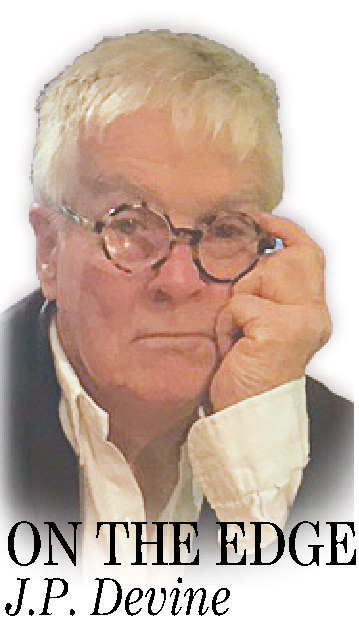“The past is never dead. It’s not even past.” — William Faulkner
With Memorial Day comes the shuffling of snapshots, the laying of wreaths and dusting of the dead entombed in silver frames on the mantels of our hearts. And we all have them, aged, yellowing, fading. We all have them.
Happily, the Devine boys all came home, lucky and handsome as ever, without loss of limbs or features. They came home and married and settled down. They got jobs with pensions, new cars and little houses with lawns, close by. Except for Bud. He opted to get married and set about building his home far away in the woods near Seattle.
Bud was something of a legend in countless family stories. He was the snappily dressed ladies’ man, the tango dancer, champion swimmer and gymnast, always somewhere away.
He was the first to go my father’s way, into the Navy at age 17 and stationed at Pearl Harbor in 1940. I knew him only as the sailor in snapshots, surfing, swimming at Waikiki Beach. He was a legend, like a movie star in a fan magazine.
When I was 15, I became the family “problem.” I was playing hooky, hiding out in libraries, afternoon movies, one after another, lost in dreams.
A family decision was made. Bud was called upon and agreed to take me and help out. I didn’t object. I was going to live with the legend, the “legendary” brother in a faraway place.
The man who met me at the station that summer, with his lovely young blond wife, was no longer the one I had heard all the stories about. He was older, grayer and quieter. She hugged me. He shook my hand. We had lunch in a diner, and he said, “Well, let’s go home. We’ve got lots of work to do.”
There was a snapshot once, circa 1947. We were standing on a long dock on the shores of Meydenbauer Bay, a small placid cove in then-heavily wooded Bellevue, a suburb of Seattle.
I remember the moment well. We’d taken a break from working on his house on the hill. We were standing apart, squinting in the sun. We were not smiling; he had just chastised me for something. In the two years I was there, there was a lot of hard work, silence, loneliness, distance. Few smiles.
One day when I was home there alone, rooting about, I explored the house and discovered that Bud slept with a .45-caliber pistol and a knife under his pillow. Who was this man? Where was I now? In a movie?
I would hear arguments late at night, muffled angry words. One night as I watched from my bedroom window, he went to the new house, and with his fist, knocked out some of his new windows. I had to sweep up the glass the next day as he replaced them.
We never spoke of it. We never spoke of anything.
In the September of that year, the week of my birthday, an old shipmate of Bud’s, Carl, a gnarly, funny old divorced sailor with thick nose hairs, rheumy eyes and a constant beer breath, came to help Bud finish the house. It was from Carl and out of Bud’s earshot that I learned about their old ship, the USS New Orleans, which had earned 17 battle medals in the Pacific.
Carl went on and on about the kamikaze attacks, the torpedo that sheared off the bow, and the ladies’ man who had to slip into the jungle at night to gather palm wood to shore up the missing bow, and how they steamed backwards at 2 knots to a safe harbor at Cockatoo Island.
I learned how my “tango dancer” dove overboard under enemy fire to swim out to rescue his friend George Wunder, a happy, blond farm boy from Iowa, who had been blown overboard, only to see him get taken under by a falling steel girder before he could reach him. That was my brother.
It was quite an education.
Today, we all know about post-traumatic stress disorder and its horror. It’s talked about everywhere on every news show. But it wasn’t talked about as much then. It had other names: battle fatigue, war neuroses, shell shock. It was about sons who sat silently in back rooms, husbands who killed themselves and brothers who forgot how to tango.
Epilogue: My brother Mathias “Bud” Devine died of cancer in San Diego, a divorced alcoholic, estranged from his two children. His ashes were folded into the surf at the naval base there to join George, the farm boy from Iowa, and their shipmates.
Monday is their day.
J.P. Devine is a Waterville writer. “Bud” is an excerpt from his forthcoming memoir, “A Life in Pieces.”
Send questions/comments to the editors.



Success. Please wait for the page to reload. If the page does not reload within 5 seconds, please refresh the page.
Enter your email and password to access comments.
Hi, to comment on stories you must . This profile is in addition to your subscription and website login.
Already have a commenting profile? .
Invalid username/password.
Please check your email to confirm and complete your registration.
Only subscribers are eligible to post comments. Please subscribe or login first for digital access. Here’s why.
Use the form below to reset your password. When you've submitted your account email, we will send an email with a reset code.